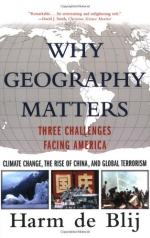
|
| Name: _________________________ | Period: ___________________ |
This test consists of 15 multiple choice questions and 5 short answer questions.
Multiple Choice Questions
1. Where does de Blij hope that a new, more liberal form of Islam will emerge?
(a) In Europe.
(b) In the Pacific Rim.
(c) In Africa.
(d) In the Middle East.
2. Why did the U.S. support the anti-Soviet rebels in Afghanistan?
(a) Because it supported the religious views of the Taliban.
(b) Because it hoped to set up a U.S. military base in Afghanistan.
(c) Because it did not want Afghanistan to become a Communist country.
(d) Because it was interested in drilling for oil in the Caspian Sea region.
3. What does de Blij think is the greatest risk to stability in Africa?
(a) Natural disasters such as droughts.
(b) Corruption in government.
(c) The rise of Islamic extremism.
(d) Lack of infrastructure.
4. What is a madrassas?
(a) An Islamic holy place.
(b) A place where Muslims go on pilgrimmage.
(c) An Islamic extremist school.
(d) A Muslim church or temple.
5. Who was King Leopold II?
(a) The last leader of South Africa during apartheid.
(b) The Belgian King who murdered 10 million Congolese.
(c) The author of an important book on geography and Africa.
(d) The leader of the Kenyan independence movement.
6. What treaty, signed by Italy, France, West Germany, the Netherlands, Belgium, and Luxembourg in 1957, created the European Economic Community?
(a) The Treaty of Versailles.
(b) The Treaty of Brussels.
(c) The Treaty of Maastricht.
(d) The Treaty of Rome.
7. How far did the Muslim world once reach?
(a) From Palestine to India.
(b) From Spain to western China.
(c) From Saudia Arabia to Iran.
(d) From Turkey to Kazakhstan.
8. What is the easiest way to trace how terrorist groups get funded?
(a) Listen in on international phone calls.
(b) Follow the trail of bank transactions and internet contacts.
(c) Have agents infiltrate terrorist cells.
(d) Send marked American dollars to a terrorist group.
9. How did the slave trade between 1700 and 1810 affect Africa?
(a) Europeans brought diseases to Africa that killed off even more people.
(b) African governments became much more corrupt.
(c) The slave trade brought Africa into the global economy.
(d) The social order collapsed because one sixth of the population was gone.
10. Who was Shamil Basayev?
(a) An Islamic cleric-teacher with a great deal of influence.
(b) Russia's first president after the collapse of the Soviet Union.
(c) A leader in the Chechen independence movement.
(d) The leader of an organized crime gang.
11. What happened in Russia in the year 2000 that de Blij says was previously unimaginable?
(a) The development of a transportation infrastructure.
(b) A democratic transition of power.
(c) An invasion by one of its former satellite countries.
(d) An unusually long summer growing season.
12. How does the Chechen independence movement affect Groznyy?
(a) Groznyy is devastated by fighting.
(b) Groznyy is bombed into a shell of a city.
(c) Much of Groznyy's population emigrates to Russia.
(d) Groznyy's unemployment rate skyrockets.
13. Why do the Chechens feel particularly strong about pursuing their independence?
(a) Natural resources in Chechnya could more easily be developed after independence.
(b) Chechens were inspired by the independence gained by neighboring countries.
(c) Russia's government is too corrupt for most Chechens.
(d) Stalin forced all the Chechens to travel to Siberia during World War II.
14. What is Russia's connection with the European Union?
(a) Russia is not being considered for admission to the European Union.
(b) Russia is likely to be accepted into the European Union.
(c) Russia was once, but no longer is, part of the European Union.
(d) Russia was invited, but has refused to join, the European Union.
15. Which of the following locations seems like a likely target for terrorists, according to de Blij?
(a) Airplanes traveling between North America and Europe.
(b) Large cities in secular Western countries.
(c) Popular Western resorts located near known terrorist refuges.
(d) Western hotels in countries that are allied with the U.S.
Short Answer Questions
1. Why is sub-Saharan Africa so isolated?
2. Why is Russia's population declining?
3. What does de Blij say is the difference between terrorist acts committed by the Corsicans, the Basques, the Tamils, and the Chechens, and terrorist acts committed by al Qaeda?
4. In which of the following nations is terrorism likely to thrive, according to de Blij?
5. What did H.J. Mackinder argue in what de Blij calls the "most often cited article in geography"?
|
This section contains 789 words (approx. 3 pages at 300 words per page) |

|




